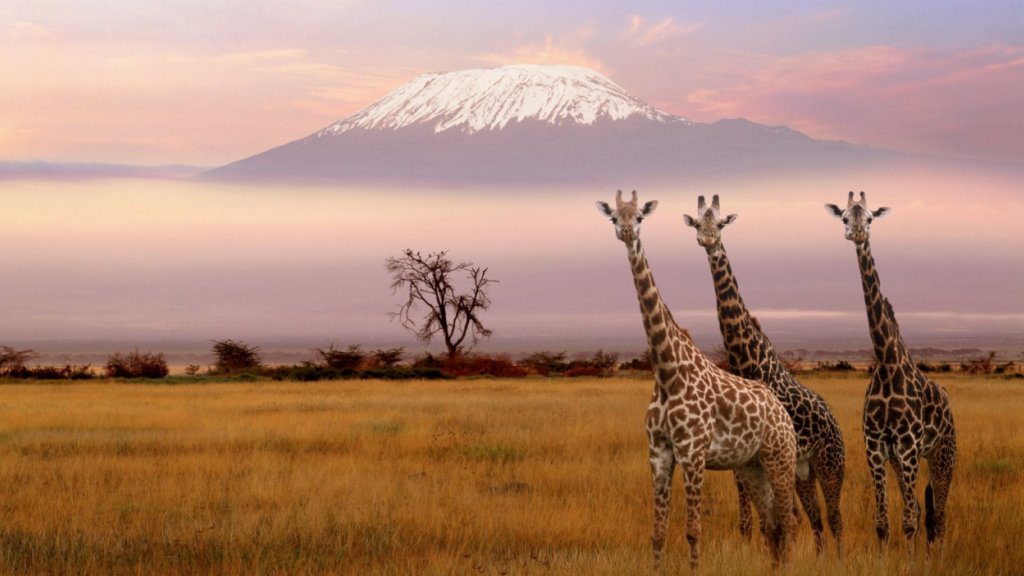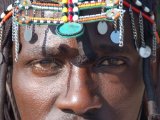Kenya is a country rich in wildlife, culture, history, beauty and friendly, welcoming people. Kenya is geographically diverse, from snow-capped mountain peaks to extensive forests to wide-open plains. Key geographical attractions include the Great Rift Valley, which features extinct volcanoes and hot springs, and Kenya's coastline, complete with reefs and magnificent beaches. Combine all this with a well-developed tourist infrastructure of hotels, lodges, campsites and a variety of activities, and it’s no wonder Kenya is a popular tourist destination attracting millions of visitors each year.

Kenya
General Information
From snow-capped mountains to the deep Rift Valley with its extinct volcanoes and hot springs, Kenya offers a breathtaking natural beauty that is distinctly spectacular. Inland, there are wide-open plains and savannahs, arid deserts and undisturbed forests. Along the coast there are magnificent sandy beaches and access to amazing coral reefs. Whether you choose to laze in the tropical sun, swim in the warm turquoise waters of the Indian Ocean or climb Mount Kenya, you will experience an unparalleled variety of beauty everywhere you travel. Go on safari to spot the "Big Five" animals in the wild, or simply enjoy our history, culture and lifestyle. Kenya has something for everyone.
Enjoy this Kenya Video Presentation
General Facts:
Size (land area): 580,367 sq km (224,080 sq miles). Kenya is a bit smaller than France.
Border countries: Ethiopia, Somalia, South Sudan Tanzania & Uganda.
Elevation Extremes: Lowest point: Indian Ocean; the highest point is Mount Kenya 5,199 m (17,057 feet) above sea level.
Population: 43,013,341 belonging to the following Ethnic groups: Kikuyu 22%, Luhya 14%, Luo 13%, Kalenjin 12%, Kamba 11%, Kisii 6%, Meru 6%, other African 15%, non-African (Asian, European, and Arab) 1%
Religion: Protestant 45%, Roman Catholic 33%, Muslim 10%, indigenous beliefs 10%, other 2%
Languages: English (official), Kiswahili (official), numerous indigenous languages
Entry Requirements: A passport and visa are required for entry into Kenya (U.S Citizens). Visas may be obtained in advance, although airport visas are available for U.S. citizens. Travelers who opt to obtain an airport visa should expect delays upon arrival.
The fee is $50 for single-entry visas, and $100 for multiple entry visas for each applicant regardless of age, and whether obtained in advance or at the airport. Evidence of yellow fever immunization may be requested, and some travelers have been turned around at immigration for not having sufficient proof of immunization. Travelers to Kenya and neighboring African countries should ensure that the validity of their passports is at least six months beyond the end of their intended stay. Kenyan immigration authorities require a minimum of two blank (unstamped) visa pages in the passport to enter the country; some travelers have experienced difficulties when they arrive without the requisite blank pages. Travelers should make sure there are sufficient pages for visas and immigration stamps to enter into Kenya and other countries to be visited en route to Kenya or elsewhere in the region.
Etiquette: Kenyans are very humble, friendly and social people. Shaking hands is a common greeting gesture and you are always welcome to strike a conversation with the person next to you. Just remember to respect Kenya's customs and culture in whatever you do and you will enjoy a pleasant relationship with its people.
Money: The Currency in Kenya is the Kenya shilling (KSHS). Most major currencies are accepted and you can convert to Kenya shillings at the nearest bank or Forex Bureau. Although the Kenya shilling often fluctuates, it is always much lower in value compared to other major currencies such as the US dollar, the sterling pound or the Euro.
Credit Cards & Traveler Checks: Credits Cards are widely accepted in all major hotels and establishments, with the most recognized being Master Card, Visa and American Express. However, you will need some cash handy because smaller shops will only accept cash.
Traveler's checks are also accepted at restaurants, stores and major hotels. American Express and Visa are the most recognized brands of traveler's checks in Kenya. Always have a photo ID, and never sign the checks until you are ready to use them. If they are lost or stolen, contact the company that issued them. It may be wise to also contact the police as some companies that issue traveler's checks require a police report.
Tipping: Most major hotels and restaurants include a service charge in their bill. Although tipping is not mandatory, you may tip porters and taxi drivers at your discretion. Ten percent is customary in restaurants, clubs and bars where a service charge is not included. It is also a customary to tip your personal Safari Driver / Guide.
ATM’s: ATM machines are available 24 hrs at all major banks, and you can use your ATM debit card on Kenya's ATM machines. However, you will incur a small international transaction fee when you use your ATM debit/credit card.
Food and Water: One delightful element about Kenya food is its diverse flavor. Kenyan cooking draws upon a variety of ethnic traditions merged with the seasonings and tastes of outside countries. Because of Kenya's long-standing relationship with foreign settlers and its colonization by the British, the taste, cooking methods and presentation of Kenyan foods have been greatly influenced by the Indians, Arabs, Europeans, and Pakistanis as well as some western countries. Kenyan food is mainly traditional and nearly all of Kenya's tribes boast a specific meal as their very own staple food. Typical Kenyan cuisine is readily available in almost every Kenyan eatery; you can find it served in restaurants, hotels, clubs and entertainment venues with an African flair.
Adventurous meat eaters can also indulge in safe wildlife game meat, such as crocodile and ostrich, served in specialized restaurants. Game meat is rarely eaten in Kenyan homes. While most ingredients are used for ethnic food preparations, Western foods such as French fries, burgers, pizza, and pasta are readily available in some restaurants and fast-food places.
As a rule of thumb – always drink bottled water when traveling overseas.
Alcohol & Drugs: Kenya's drinking age is 18 years. It is illegal to drink out of a bottle on the streets of many cities. Drugs and narcotics are illegal in Kenya - this is strictly enforced.
Electricity: Current is 220/240AC 50HZ. You will also need an adapter to fit the plugs in Kenya.
Communication and Internet: Internet access is available in all major hotels, lodges and post offices in Kenya. Business centers and internet cybercafés are popular in most cities throughout the country. Simply walk into a cybercafé or business center and pay per use. However, internet access is limited in very remote towns and camping sites.
Kenya has a very accessible GSM cellular network. You can purchase a cheap handset in Kenya and buy local calling cards to make your international calls. Alternatively, if you own a handset that accepts SIM cards, you can buy local cards and save money, as long as you have "unlocked" your phone for international use. Before you travel to Kenya, call your carrier to ask for unlock codes or search the internet for instructions. When you convert your phone to a Kenyan phone, you do not pay for incoming calls, only the calls you originate. You can also make international phone calls from your hotel, cybercafés, phone booths and other places that offer international calling services.
What to Wear in Kenya - Dress Code
If you are going to Kenya for a vacation, holiday, safari or leisure, bring light-to-moderate casual wear such as cargo pants, jeans, cotton shirts and the like. The dress code in Kenyan culture is conservative. Also, many Kenyans adhere to different cultural, religious and customary dress styles. Jeans and decent tops/blouses for ladies are perfect. If you are going for business, you can keep it business-casual, however, business suits, tie and formal wear are preferred. Swimsuits are acceptable at the beach but not in public places.
Evening Wear: Kenyans dress up for special occasions, especially when going out clubbing/dancing, to church, to sporting and other events or out to dinner. In some restaurants and clubs, you will probably be fine wearing shorts and a t-shirt, but if you are considering dining at one of the more up-scale restaurants or having a social night out, you may want to show off your nicer clothing and join the party!
Safety & Security
You always want to be aware of your surroundings when traveling away from home. Traveling to Kenya is no different. Be vigilant when in public places and even more when venturing out at night. In case of robbery, report the incident at the nearest police station. Kenya has a Tourist Safety and Communication Center that is always on call. They offer a 24hr tourist helpline (02-604767) where you can seek assistance if needed.
Health Advice for Kenya
Before you travel to Kenya, make sure that you are up to date on all immunizations. Although there are currently no inoculations that you must have when traveling to Kenya, if you intend to visit other countries such as the Democratic Republic of Congo, Rwanda, Egypt, or other such areas that may be deemed infected, you will need inoculations. In such cases, you should make sure you have the following immunizations (depending on the specific area you intend to visit):
• Hepatitis (A and B)
• Typhoid
• Tetanus
• Yellow Fever
• Malaria Prescription
Other health advice when traveling to Kenya is to make sure you protect yourself from mosquito bites, which could lead to malaria. Some protective measures against mosquito bites include wearing long sleeved shirts/blouses and long pants, using mosquito repellent with a minimum of 30 percent DEET, and using mosquito nets. If you will be traveling to the Kenyan coast or Western Kenya, it is advisable to take anti-malaria pills.
Look into purchasing travel and medical insurance while abroad, just in case something happens. These types of short-term insurance services are available through some travel agencies and medical insurance companies. They may also be part of the services you already receive with your credit cards, so check with your credit card company. It is better to play it safe than end up sorry.
When to Travel?
Kenya enjoys a wonderful tropical climate. It is generally warm all year round, with plenty of sunshine and cooler nights and mornings. Visitors are able to enjoy most activities on the beaches and in the national parks all year round. Since Kenya lies on the equator, the seasonal temperature changes are not extreme. However, due to the differing topography, you will experience different weather patterns when traveling across Kenya. The hottest months of the year are February and March with temperatures as high as 93°F (34°C) while the coolest season falls between July and August with temperatures dropping to around 60°F (16°C). Kenya provides very perfect weather for those who live in colder countries to escape to…
Pending on you interests, you may choose to visit Kenya throughout the year!
The Best Time to go on Safari in Kenya
No doubt this is Kenya’s number 1 attraction: The annual migration of millions of wildebeest, zebra and gnu's descend on the Mara plains with predators close behind. The best time to see this wildlife spectacle is from July to October. Other parks in Kenya are also excellent and the best time to visit these would be during the dry seasons -- January through March and July through October.
With the scarcity of water during the dry seasons, the animals tend to gather in more concentrated numbers around permanent water holes, rivers and lakes, so they are easier to find. The vegetation is also less lush which simply means that viewing animals from a distance is easier.
Best time to enjoy a beach holiday in Kenya is from December to March
Whether you want to explore the historical Swahili town of Lamu, or enjoy the picture perfect beaches of Malinidi and Watamu, the best time to go is December to March. The coastal temperatures remain steadily hot for most of the year, but on the beach the humidity is kept at bay by the ocean breeze. The wettest months are April to May and there's also a short rainy season from October to November. Swahili Cultural festivals are often held during November and Ramadan may affect your vacation in this predominantly Muslim area of Kenya, see more about traveling in Africa during Ramadan. Find out what the weather and average temperatures are for Mombasa.
Best time to trek Mount Kenya
Mount Kenya has permanent snow at its summit, so it's cold year round. At night at the higher elevations the temperature can drop as low as 14 Fahrenheit (-10 Celsius). Typically the early mornings on the mountain are sunny and dry, and clouds often form by noon. It is possible to hike Mount Kenya throughout the year but it gets more difficult during the rainy seasons from mid-March to mid-June and October to mid-December. The best time to go is between January - February, and July - October.
Best Time to Visit Northern Kenya
Northern Kenya is a fairly arid region with little rainfall and abundant sunshine year round. This is camel country. Average temperatures vary between 104 and 68 Fahrenheit (40 and 20 Celsius). The best time to visit this area is June, July, August and December. Northern Kenya is sparsely populated, home of the Samburu and several other traditional tribes. It is filled with natural, rugged beauty.
Travel Highlights
Maasai Mara
The Maasai Mara Game Reserve is widely considered to be Africa’s greatest wildlife reserve. The Mara comprises200 sq miles of open plains, woodlands and forests. Contiguous with the plains of the Serengeti, the Mara is home to a breathtaking array of life. The vast grassland plains are scattered with herds of Zebra, Giraffe, Gazelle, and Topi. The Acacia forests abound with Bird life and Monkeys. Elephants and Buffalo wallow in the wide Musiara Swamp. The Mara and Talek rivers are brimming with Hippos and Crocodiles.
Each year the Mara plays host to the world’s greatest natural spectacle, the Great Wildebeest Migration from the Serengeti. From July to October, the promise of rain and fresh life giving grass in the north brings more than 1.3 million Wildebeest together into a single massive herd. They pour across the border into the Mara, making a spectacular entrance in a surging column of life that stretches from horizon to horizon.
The people that inhabitant Maasai are a strongly independent people who still value tradition and ritual as an integral part of their everyday lives. They regard themselves not just as residents of this area but that they are as much a part of the life of the land as the land is part of their lives. Traditionally, the Maasai rarely hunt and living alongside wildlife in harmony is an important part of their beliefs .Lions and Wildebeest play as important a role in their cultural beliefs as their own herds of cattle. This unique co-existence of man and wildlife makes this Maasai land one of the world’s most unique wilderness regions.
Giraffe Center - Nairobi
The AFEW (African Fund for Endangered Wildlife) Giraffe Centre is located in Langata, just outside Nairobi. The center has been ostensibly set up as a breeding centre for the endangered Rothschild giraffe, but now operates conservation/education programs for Kenyan school children.
There is good information on giraffes available here, and an elevated feeding platform where visitors meet the resident giraffes face to face. Hand feeding giraffes is an education in itself. You will see, close at hand, how they use their long, prehensile tongues to remove leaves from prickly acacia branches.
The AFEW centre is also home to Giraffe Manor, a beautifully maintained colonial home, now an exclusive guesthouse. The center’s giraffe population wander freely through the lush gardens, and pay an occasional visit to the house itself, often pushing their heads through the French Windows to inspect the breakfast table.
Karen Blixen House & Museum
For anyone with an interest in Karen Blixen's book Out of Africa or the subsequent film, this museum is a must see. The author lived on a coffee estate in a house known as Boganifrom 1914 until 1931.
This area has now developed into the modern suburb of Karen on the outskirts of Nairobi.
The house is now a National Museum, and is maintained for visitors in its original condition. Those who have read the book, or seen the film (which was filmed on location here) will recognize the house with its sprawling tropical garden and views of the nearby Ngong Hills.
Efforts have been made to decorate all of the rooms of the house in their original style.
The house itself is furnished with a mixture of original decor and props from the 1985 film production. The grounds contain displays of farming equipment from the plantation.
The museum has excellent trained staff who are well versed in the history of the house and the life of Karen Blixen. They are available to answer queries and to give personally guided tours
Amboseli - a land of giants.
This is a place of wide dry plains, where the horizons stretch into the furthest distance and become one with the sky. Amboseli is renowned for its elephant populations and large herds, including some impressively tusked bulls are drawn to a series of large, lush swamplands. But the most impressive giant of all is Mt Kilimanjaro. Africa’s largest mountain lies just over the border in Tanzania, but the most impressive views of its snow-capped peak are to be found in Amboseli. The early light of dawn turns the mountain a dark hue of purple, and its snows into an ethereal pink. The sight of Kilimanjaro high above herds of elephant crossing the plains of Amboseli is a timeless African image. This area is home to many Maasai communities, centered around the Amboseli National Park. The park is 400 sq kms, with its southern boundary along the Tanzanian border. The park is home to more than just Elephants, and herds of wildebeest, zebra and impala graze on the open plains.. There are areas of acacia forest that make for good birding, and are home to many small mammals. Cheetah are also often sighted here.
Hell’s Gate National Park
Hell’s Gate National Park covers an area of 68.25 square km and is situated in the environs of Lake Naivasha about 90 km from Nairobi. The park is 14 km after the turnoff from the old Nairobi-Naivasha highway. It is characterized by diverse topography and geological scenery. It is an important home of the lammergeyer. Hell’s Gate has two gates that are used by visitors – the main Elsa Gate and the Olkaria Gate. The latter also serves the Olkaria Geothermal Station that is located inside the National Park.
Climatic conditions - Warm and dry
Attractions - Game viewing, raptor nesting in cliffs, spectacular gorge walks, hot springs, scenic landscape, the Geothermal Station, Maasai culture.
Wildlife - Includes eland, buffalo, lion, giraffe, zebra, leopard, impala, Grant’s and Thomson’s gazelle, klipspringer, rock hyrax and Chanler’s mountain reedbuck
Access - Roads: The Park is accessible via tarmac road from Nairobi. (90 km) via Naivasha town on the Lake Road South at Junction 5 km south of Naivasha.
Accommodation -While there is no accommodation in the park, a wide range of options exist in nearby Naivasha, or along Moi South Lake Road which leads from Naivasha to the park.
Best time to visit -All year round
Activities -Hiking, camping, rock climbing, biking, bird watching and wildlife viewing
Tsavo East and Tsavo West
The twin National Parks of Tsavo East and West together form one of Africa’s largest wilderness reserves. This single National Park is larger than the island of Jamaica. Tsavo as a whole consists of 10 million acres of pure wilderness, incorporating savannah, ranges and hills, acacia and montane forest, and an extensive river system.
The vast plains of Tsavo are crossed by the main Nairobi-Mombasa railroad. This historic railway was, in 1899, the scene of one of Africa’s greatest Adventure stories.
Two large lions actively preyed on the railway workers as they built a bridge over the Tsavo river, claiming over 120 victims. They evaded hunters for well over a year, and the legend of the Maneaters of Tsavo was born. The sheer scale of Tsavo gives the visitor a chance to really get away from it all, and to explore the wild in total solitude. On safari here you will see large herds of Elephant, their hides often a luminous red with dust, as well as Lion, Buffalo, Eland, Giraffe Impala, Kudu and possibly Rhinoceros.
Tsavo is a birdwatcher’s paradise with numerous species of weavers, hornbills, sunbirds, rollers, and raptors commonly seen. One of Tsavo’s most interesting geographical features is the Lugard Falls, where white water rages through a series of spectacular rock formations.
Also not to be missed is the volcanic Mzima springs. These natural springs produce 50 million gallons of fresh sparkling water daily. These waters are alive with shoals of barbel and Hippopotamus and waterfowl. A unique underwater observatory has been built that gives you an incredible view of this crystal clear underwater world, where massive hippos glide silently through swirling shoals of barbel.
Mount Kenya
Mt Kenya, Africa’s second highest peak is regarded as the realm of Ngai, god of the local Kikuyu people. Traditionally, all Kikuyu home were built to face this sacred peak. They call it Kirinyaga, or place of light.
The mountain is an awe-inspiring sight. Its ragged series of peaks are crowned with snow, and its slopes are thick with forest. The mountain is best seen at dawn, when the days early light silhouettes its impressive summit high over the surrounding plains.
While the 5199 metre summit is a difficult technical climb, the lesser peak of Point Lenana (4985m) can be easily reached by any fit trekker.
This trek takes between 3 and 5 days, through a fascinating world of forests, wildlife, unique montane vegetation including podocarpus and grounsel, and finally one of the worlds rarest sights, equatorial snow. For those who don’t want to climb the Mountain the cool highlands that surround its base are well worth a visit. The forests are ideal for game viewing, and there are crystal clear mountain streams that abound with Trout.
Getting Around - Main road access to Mt Kenya is via Nanyuki or Naro Moru, both easily accessed from Nairobi by bus/matatu or private transport. Some trekkers and Climbers access the Mountain from the small village of Chogoria. There is an airstrip in Nanyuki, with both scheduled and charter flights available.
Suggested Journeys
 Kenya’s Great Migration Special
Kenya’s Great Migration Special8 Days / 7 Nights • Daily departure. Recommended: July through September
Each year, the Mara plays host to the world's greatest natural spectacle, the Great Wildebeest Migration from the Serengeti. From July to October, the promise of rain and fresh life giving grass in the north brings more than 1.3 million Wildebeest together into a single massive herd. They pour across the border into the Mara, making a spectacular entrance in a surging column of life that stretches from horizon to horizon. Join us for one of earth's best displays of abundance!
 Golf Safari in Kenya
Golf Safari in Kenya8 Days / 7 Nights • Daily arrivals in Nairobi
Kenya has a golf history dating back more than 100 years. The British colonists began developing courses all over this country in the early 1900’s. Today there are over 37 courses to enjoy in a country where the weather is perfect for the game of golf year round. We have arranged a golf itinerary for the passionate golfer who wants to be challenged on some of the greatest golf courses in the world while on safari at world class nature reserves. We invite you to play golf in Africa and experience one of the few places remaining on earth where you can still see ancient species in their natural habitat.
Private Safari, featuring world class Golf Courts throughout Kenya
 Affordable Safari in Kenya 2020
Affordable Safari in Kenya 20207 Days / 6 Nights • Daily arrivals in Nairobi, April 1 through June 6, 2020
Explore the Amboseli National Park, Lake Nakuru, and the unforgettable Mara on this 7-day Safari affordable adventure! For a limited time, you can embark on a Safari for as low as $2395 per person. Valid April 1 through June 6, 2020.
Featuring Nairobi, Amboseli National Park, Lake Nakuru & the Masai Mara.
 Kenya Safari & Beach Vacation
Kenya Safari & Beach Vacation11 Days / 10 Nights • Daily departure, year round
We invite you to journey with us on this classic tour of Kenya, East Africa that has been crafted to allow the traveler to have a taste of the best this region has to offer. Engage all of your senses on safaris at world class nature reserves where you will experience the serenity of the natural beauty of the area, become exhilarated with the sights and sounds of the animals and enjoy cuisine that will tantalize your taste buds. After following in the footsteps of explores, writers and adventurers you will be ready to relax or choose from a variety of water sports at one of the top 20 beach resorts worldwide!
Featured Properties
 The Karen Blixen Camp
The Karen Blixen CampKaren Blixen Camp in Kenya is an eco-friendly luxury camp, that gives a sense of the exciting explorer days when the Savannah was seldom visited and elaborate, and comfortable camps were set up providing a luxurious and stylish retreat after each day’s adventure.







